BMP4002 Business Law: Exploring the UK Legal System and Employment Law
VerifiedAdded on 2023/06/17
|8
|2714
|254
Report
AI Summary
This report provides a comprehensive overview of the UK legal system, beginning with a definition of law and an identification of the UK's legal systems. It explains classifications of law, including civil and criminal law, and examines the roles of the High Court and Supreme Court. The report also expl...
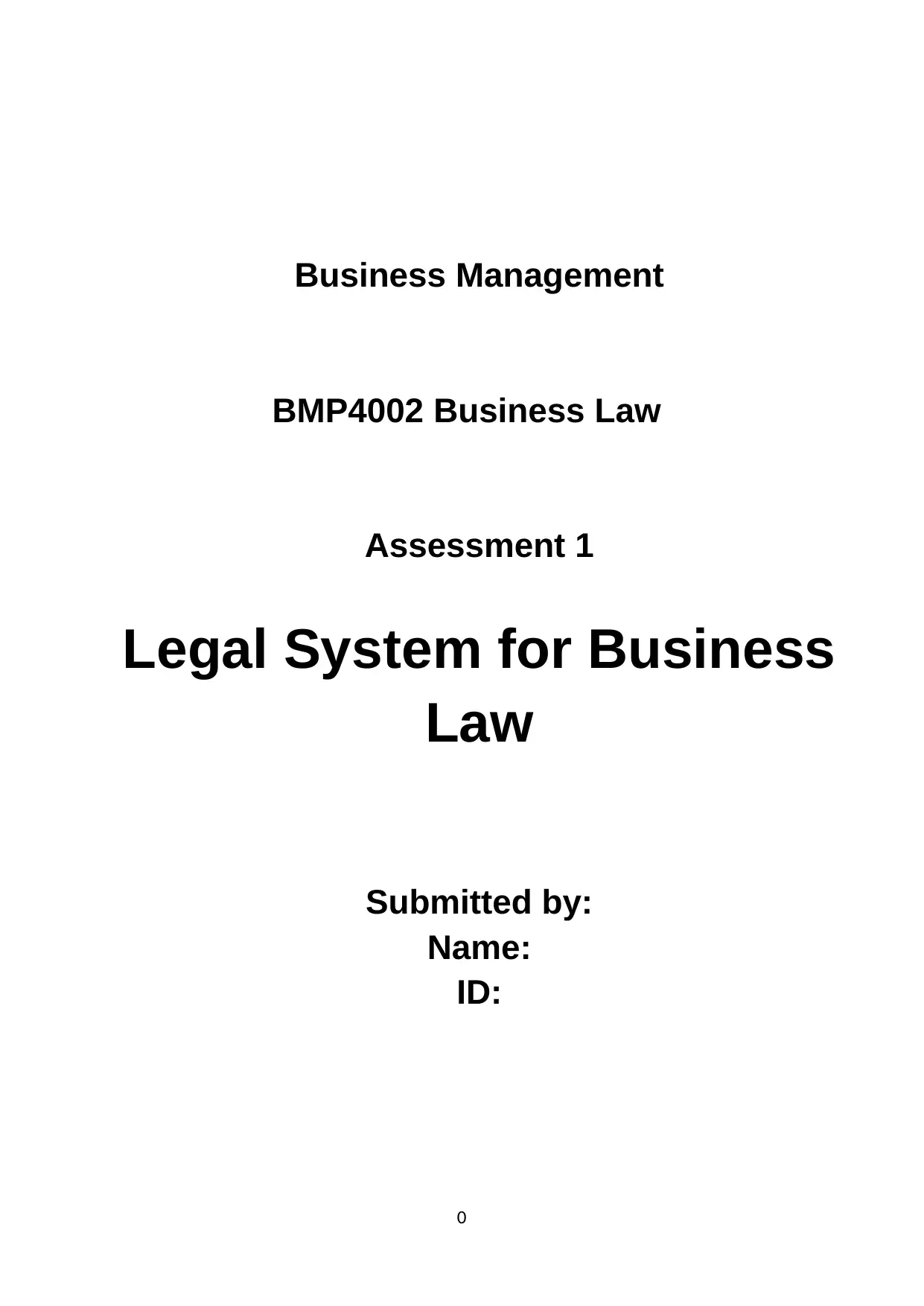
Business Management
BMP4002 Business Law
Assessment 1
Legal System for Business
Law
Submitted by:
Name:
ID:
0
BMP4002 Business Law
Assessment 1
Legal System for Business
Law
Submitted by:
Name:
ID:
0
Paraphrase This Document
Need a fresh take? Get an instant paraphrase of this document with our AI Paraphraser
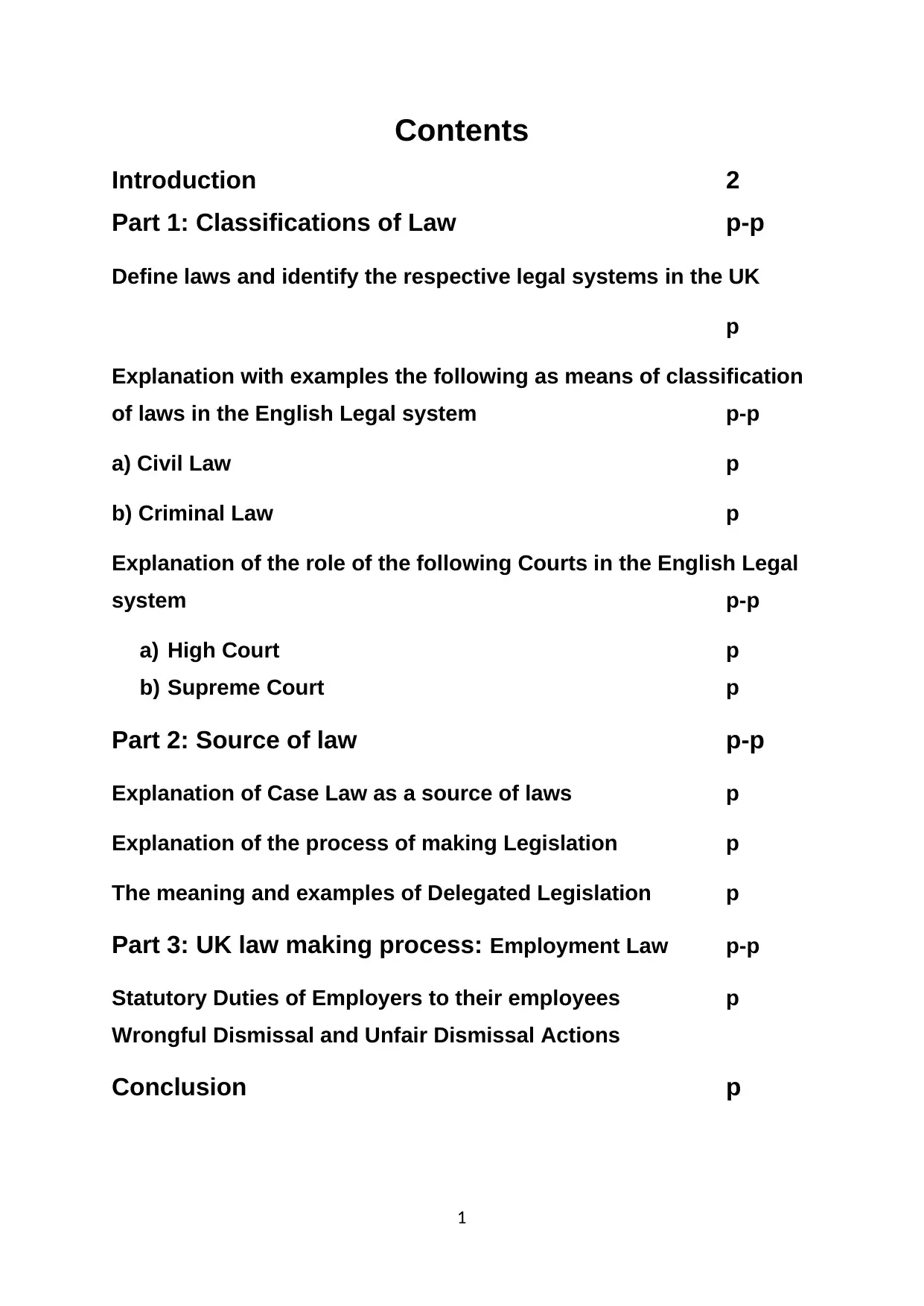
Contents
Introduction 2
Part 1: Classifications of Law p-p
Define laws and identify the respective legal systems in the UK
p
Explanation with examples the following as means of classification
of laws in the English Legal system p-p
a) Civil Law p
b) Criminal Law p
Explanation of the role of the following Courts in the English Legal
system p-p
a) High Court p
b) Supreme Court p
Part 2: Source of law p-p
Explanation of Case Law as a source of laws p
Explanation of the process of making Legislation p
The meaning and examples of Delegated Legislation p
Part 3: UK law making process: Employment Law p-p
Statutory Duties of Employers to their employees p
Wrongful Dismissal and Unfair Dismissal Actions
Conclusion p
1
Introduction 2
Part 1: Classifications of Law p-p
Define laws and identify the respective legal systems in the UK
p
Explanation with examples the following as means of classification
of laws in the English Legal system p-p
a) Civil Law p
b) Criminal Law p
Explanation of the role of the following Courts in the English Legal
system p-p
a) High Court p
b) Supreme Court p
Part 2: Source of law p-p
Explanation of Case Law as a source of laws p
Explanation of the process of making Legislation p
The meaning and examples of Delegated Legislation p
Part 3: UK law making process: Employment Law p-p
Statutory Duties of Employers to their employees p
Wrongful Dismissal and Unfair Dismissal Actions
Conclusion p
1
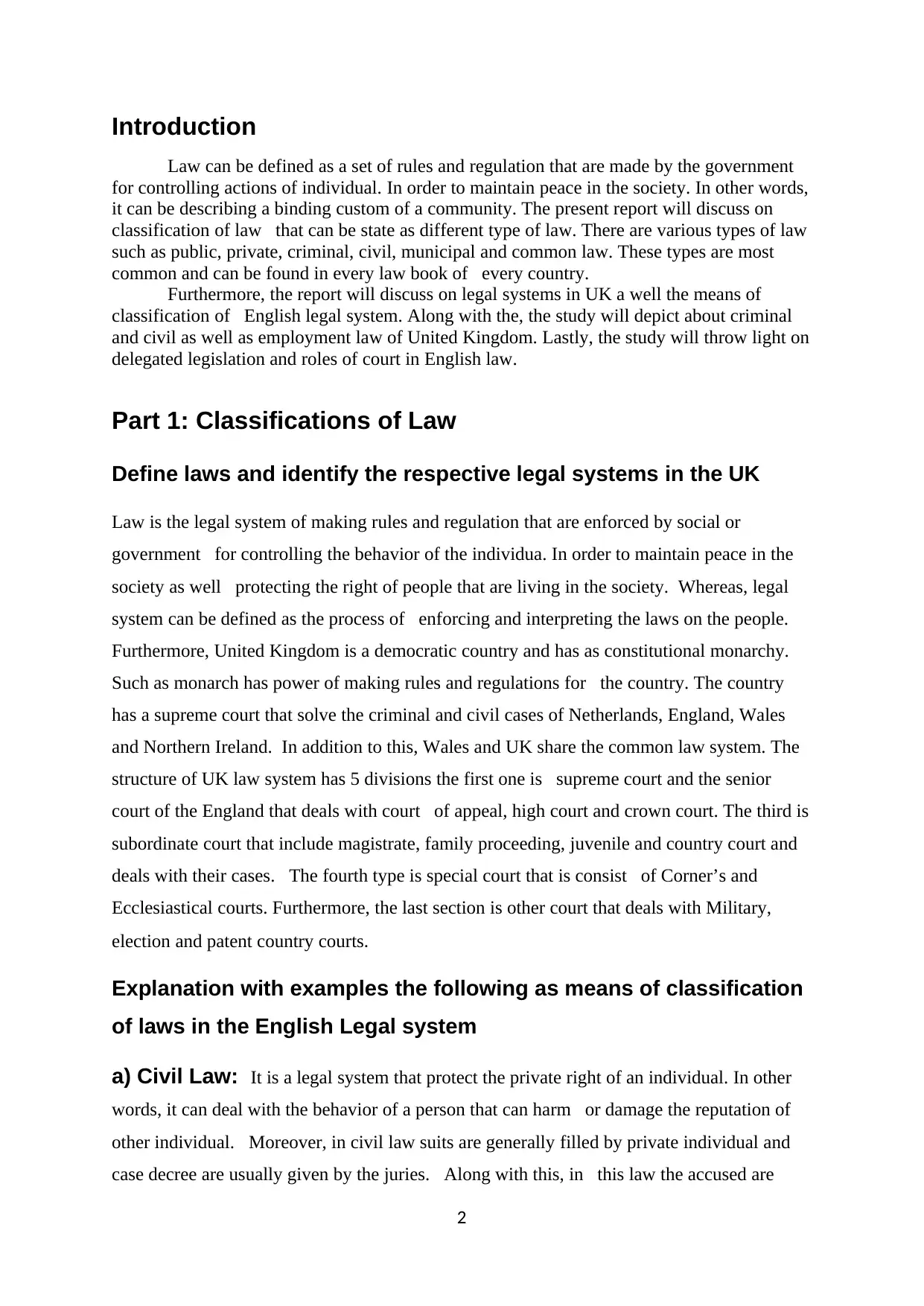
Introduction
Law can be defined as a set of rules and regulation that are made by the government
for controlling actions of individual. In order to maintain peace in the society. In other words,
it can be describing a binding custom of a community. The present report will discuss on
classification of law that can be state as different type of law. There are various types of law
such as public, private, criminal, civil, municipal and common law. These types are most
common and can be found in every law book of every country.
Furthermore, the report will discuss on legal systems in UK a well the means of
classification of English legal system. Along with the, the study will depict about criminal
and civil as well as employment law of United Kingdom. Lastly, the study will throw light on
delegated legislation and roles of court in English law.
Part 1: Classifications of Law
Define laws and identify the respective legal systems in the UK
Law is the legal system of making rules and regulation that are enforced by social or
government for controlling the behavior of the individua. In order to maintain peace in the
society as well protecting the right of people that are living in the society. Whereas, legal
system can be defined as the process of enforcing and interpreting the laws on the people.
Furthermore, United Kingdom is a democratic country and has as constitutional monarchy.
Such as monarch has power of making rules and regulations for the country. The country
has a supreme court that solve the criminal and civil cases of Netherlands, England, Wales
and Northern Ireland. In addition to this, Wales and UK share the common law system. The
structure of UK law system has 5 divisions the first one is supreme court and the senior
court of the England that deals with court of appeal, high court and crown court. The third is
subordinate court that include magistrate, family proceeding, juvenile and country court and
deals with their cases. The fourth type is special court that is consist of Corner’s and
Ecclesiastical courts. Furthermore, the last section is other court that deals with Military,
election and patent country courts.
Explanation with examples the following as means of classification
of laws in the English Legal system
a) Civil Law: It is a legal system that protect the private right of an individual. In other
words, it can deal with the behavior of a person that can harm or damage the reputation of
other individual. Moreover, in civil law suits are generally filled by private individual and
case decree are usually given by the juries. Along with this, in this law the accused are
2
Law can be defined as a set of rules and regulation that are made by the government
for controlling actions of individual. In order to maintain peace in the society. In other words,
it can be describing a binding custom of a community. The present report will discuss on
classification of law that can be state as different type of law. There are various types of law
such as public, private, criminal, civil, municipal and common law. These types are most
common and can be found in every law book of every country.
Furthermore, the report will discuss on legal systems in UK a well the means of
classification of English legal system. Along with the, the study will depict about criminal
and civil as well as employment law of United Kingdom. Lastly, the study will throw light on
delegated legislation and roles of court in English law.
Part 1: Classifications of Law
Define laws and identify the respective legal systems in the UK
Law is the legal system of making rules and regulation that are enforced by social or
government for controlling the behavior of the individua. In order to maintain peace in the
society as well protecting the right of people that are living in the society. Whereas, legal
system can be defined as the process of enforcing and interpreting the laws on the people.
Furthermore, United Kingdom is a democratic country and has as constitutional monarchy.
Such as monarch has power of making rules and regulations for the country. The country
has a supreme court that solve the criminal and civil cases of Netherlands, England, Wales
and Northern Ireland. In addition to this, Wales and UK share the common law system. The
structure of UK law system has 5 divisions the first one is supreme court and the senior
court of the England that deals with court of appeal, high court and crown court. The third is
subordinate court that include magistrate, family proceeding, juvenile and country court and
deals with their cases. The fourth type is special court that is consist of Corner’s and
Ecclesiastical courts. Furthermore, the last section is other court that deals with Military,
election and patent country courts.
Explanation with examples the following as means of classification
of laws in the English Legal system
a) Civil Law: It is a legal system that protect the private right of an individual. In other
words, it can deal with the behavior of a person that can harm or damage the reputation of
other individual. Moreover, in civil law suits are generally filled by private individual and
case decree are usually given by the juries. Along with this, in this law the accused are
2
⊘ This is a preview!⊘
Do you want full access?
Subscribe today to unlock all pages.

Trusted by 1+ million students worldwide
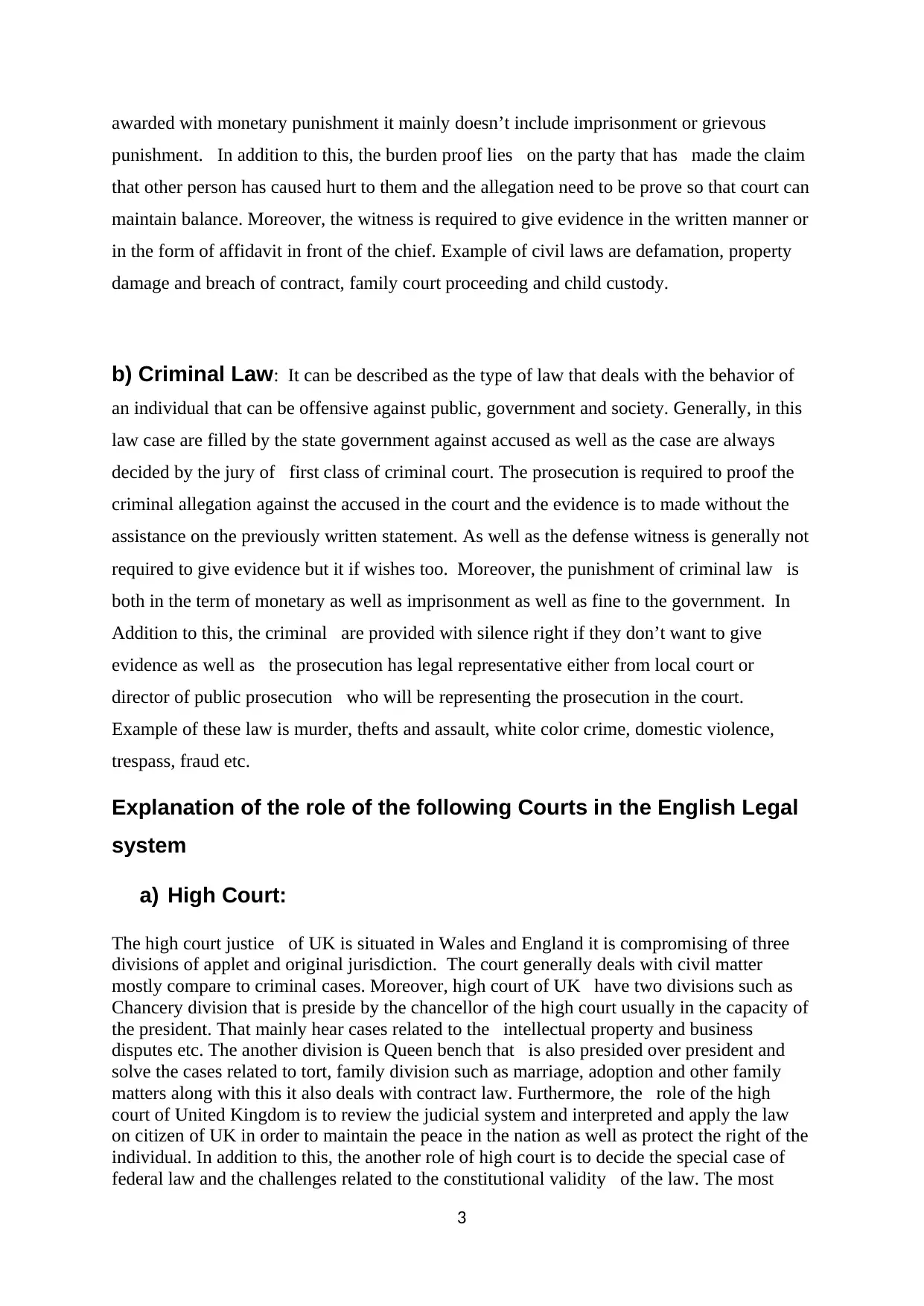
awarded with monetary punishment it mainly doesn’t include imprisonment or grievous
punishment. In addition to this, the burden proof lies on the party that has made the claim
that other person has caused hurt to them and the allegation need to be prove so that court can
maintain balance. Moreover, the witness is required to give evidence in the written manner or
in the form of affidavit in front of the chief. Example of civil laws are defamation, property
damage and breach of contract, family court proceeding and child custody.
b) Criminal Law: It can be described as the type of law that deals with the behavior of
an individual that can be offensive against public, government and society. Generally, in this
law case are filled by the state government against accused as well as the case are always
decided by the jury of first class of criminal court. The prosecution is required to proof the
criminal allegation against the accused in the court and the evidence is to made without the
assistance on the previously written statement. As well as the defense witness is generally not
required to give evidence but it if wishes too. Moreover, the punishment of criminal law is
both in the term of monetary as well as imprisonment as well as fine to the government. In
Addition to this, the criminal are provided with silence right if they don’t want to give
evidence as well as the prosecution has legal representative either from local court or
director of public prosecution who will be representing the prosecution in the court.
Example of these law is murder, thefts and assault, white color crime, domestic violence,
trespass, fraud etc.
Explanation of the role of the following Courts in the English Legal
system
a) High Court:
The high court justice of UK is situated in Wales and England it is compromising of three
divisions of applet and original jurisdiction. The court generally deals with civil matter
mostly compare to criminal cases. Moreover, high court of UK have two divisions such as
Chancery division that is preside by the chancellor of the high court usually in the capacity of
the president. That mainly hear cases related to the intellectual property and business
disputes etc. The another division is Queen bench that is also presided over president and
solve the cases related to tort, family division such as marriage, adoption and other family
matters along with this it also deals with contract law. Furthermore, the role of the high
court of United Kingdom is to review the judicial system and interpreted and apply the law
on citizen of UK in order to maintain the peace in the nation as well as protect the right of the
individual. In addition to this, the another role of high court is to decide the special case of
federal law and the challenges related to the constitutional validity of the law. The most
3
punishment. In addition to this, the burden proof lies on the party that has made the claim
that other person has caused hurt to them and the allegation need to be prove so that court can
maintain balance. Moreover, the witness is required to give evidence in the written manner or
in the form of affidavit in front of the chief. Example of civil laws are defamation, property
damage and breach of contract, family court proceeding and child custody.
b) Criminal Law: It can be described as the type of law that deals with the behavior of
an individual that can be offensive against public, government and society. Generally, in this
law case are filled by the state government against accused as well as the case are always
decided by the jury of first class of criminal court. The prosecution is required to proof the
criminal allegation against the accused in the court and the evidence is to made without the
assistance on the previously written statement. As well as the defense witness is generally not
required to give evidence but it if wishes too. Moreover, the punishment of criminal law is
both in the term of monetary as well as imprisonment as well as fine to the government. In
Addition to this, the criminal are provided with silence right if they don’t want to give
evidence as well as the prosecution has legal representative either from local court or
director of public prosecution who will be representing the prosecution in the court.
Example of these law is murder, thefts and assault, white color crime, domestic violence,
trespass, fraud etc.
Explanation of the role of the following Courts in the English Legal
system
a) High Court:
The high court justice of UK is situated in Wales and England it is compromising of three
divisions of applet and original jurisdiction. The court generally deals with civil matter
mostly compare to criminal cases. Moreover, high court of UK have two divisions such as
Chancery division that is preside by the chancellor of the high court usually in the capacity of
the president. That mainly hear cases related to the intellectual property and business
disputes etc. The another division is Queen bench that is also presided over president and
solve the cases related to tort, family division such as marriage, adoption and other family
matters along with this it also deals with contract law. Furthermore, the role of the high
court of United Kingdom is to review the judicial system and interpreted and apply the law
on citizen of UK in order to maintain the peace in the nation as well as protect the right of the
individual. In addition to this, the another role of high court is to decide the special case of
federal law and the challenges related to the constitutional validity of the law. The most
3
Paraphrase This Document
Need a fresh take? Get an instant paraphrase of this document with our AI Paraphraser
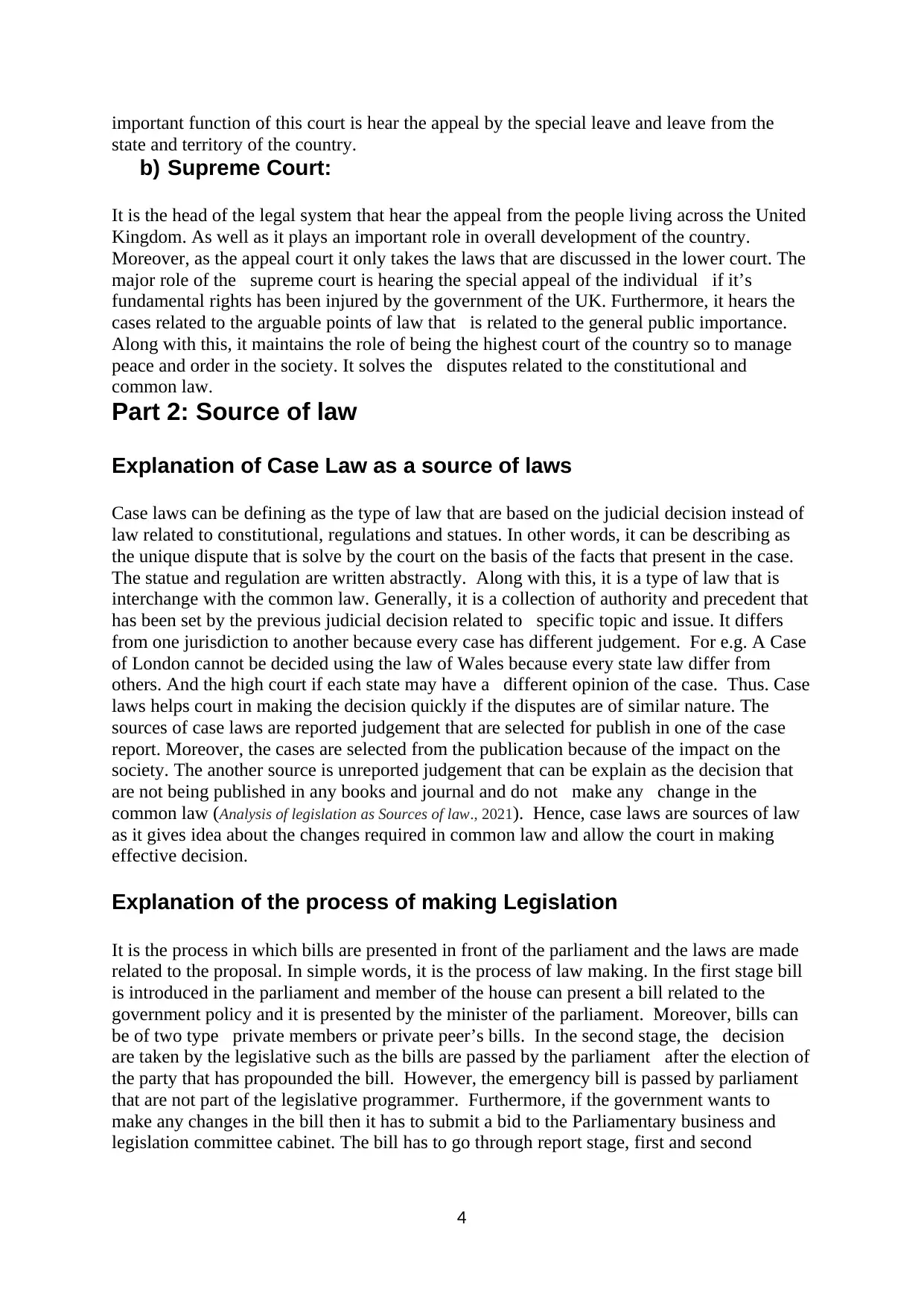
important function of this court is hear the appeal by the special leave and leave from the
state and territory of the country.
b) Supreme Court:
It is the head of the legal system that hear the appeal from the people living across the United
Kingdom. As well as it plays an important role in overall development of the country.
Moreover, as the appeal court it only takes the laws that are discussed in the lower court. The
major role of the supreme court is hearing the special appeal of the individual if it’s
fundamental rights has been injured by the government of the UK. Furthermore, it hears the
cases related to the arguable points of law that is related to the general public importance.
Along with this, it maintains the role of being the highest court of the country so to manage
peace and order in the society. It solves the disputes related to the constitutional and
common law.
Part 2: Source of law
Explanation of Case Law as a source of laws
Case laws can be defining as the type of law that are based on the judicial decision instead of
law related to constitutional, regulations and statues. In other words, it can be describing as
the unique dispute that is solve by the court on the basis of the facts that present in the case.
The statue and regulation are written abstractly. Along with this, it is a type of law that is
interchange with the common law. Generally, it is a collection of authority and precedent that
has been set by the previous judicial decision related to specific topic and issue. It differs
from one jurisdiction to another because every case has different judgement. For e.g. A Case
of London cannot be decided using the law of Wales because every state law differ from
others. And the high court if each state may have a different opinion of the case. Thus. Case
laws helps court in making the decision quickly if the disputes are of similar nature. The
sources of case laws are reported judgement that are selected for publish in one of the case
report. Moreover, the cases are selected from the publication because of the impact on the
society. The another source is unreported judgement that can be explain as the decision that
are not being published in any books and journal and do not make any change in the
common law (Analysis of legislation as Sources of law., 2021). Hence, case laws are sources of law
as it gives idea about the changes required in common law and allow the court in making
effective decision.
Explanation of the process of making Legislation
It is the process in which bills are presented in front of the parliament and the laws are made
related to the proposal. In simple words, it is the process of law making. In the first stage bill
is introduced in the parliament and member of the house can present a bill related to the
government policy and it is presented by the minister of the parliament. Moreover, bills can
be of two type private members or private peer’s bills. In the second stage, the decision
are taken by the legislative such as the bills are passed by the parliament after the election of
the party that has propounded the bill. However, the emergency bill is passed by parliament
that are not part of the legislative programmer. Furthermore, if the government wants to
make any changes in the bill then it has to submit a bid to the Parliamentary business and
legislation committee cabinet. The bill has to go through report stage, first and second
4
state and territory of the country.
b) Supreme Court:
It is the head of the legal system that hear the appeal from the people living across the United
Kingdom. As well as it plays an important role in overall development of the country.
Moreover, as the appeal court it only takes the laws that are discussed in the lower court. The
major role of the supreme court is hearing the special appeal of the individual if it’s
fundamental rights has been injured by the government of the UK. Furthermore, it hears the
cases related to the arguable points of law that is related to the general public importance.
Along with this, it maintains the role of being the highest court of the country so to manage
peace and order in the society. It solves the disputes related to the constitutional and
common law.
Part 2: Source of law
Explanation of Case Law as a source of laws
Case laws can be defining as the type of law that are based on the judicial decision instead of
law related to constitutional, regulations and statues. In other words, it can be describing as
the unique dispute that is solve by the court on the basis of the facts that present in the case.
The statue and regulation are written abstractly. Along with this, it is a type of law that is
interchange with the common law. Generally, it is a collection of authority and precedent that
has been set by the previous judicial decision related to specific topic and issue. It differs
from one jurisdiction to another because every case has different judgement. For e.g. A Case
of London cannot be decided using the law of Wales because every state law differ from
others. And the high court if each state may have a different opinion of the case. Thus. Case
laws helps court in making the decision quickly if the disputes are of similar nature. The
sources of case laws are reported judgement that are selected for publish in one of the case
report. Moreover, the cases are selected from the publication because of the impact on the
society. The another source is unreported judgement that can be explain as the decision that
are not being published in any books and journal and do not make any change in the
common law (Analysis of legislation as Sources of law., 2021). Hence, case laws are sources of law
as it gives idea about the changes required in common law and allow the court in making
effective decision.
Explanation of the process of making Legislation
It is the process in which bills are presented in front of the parliament and the laws are made
related to the proposal. In simple words, it is the process of law making. In the first stage bill
is introduced in the parliament and member of the house can present a bill related to the
government policy and it is presented by the minister of the parliament. Moreover, bills can
be of two type private members or private peer’s bills. In the second stage, the decision
are taken by the legislative such as the bills are passed by the parliament after the election of
the party that has propounded the bill. However, the emergency bill is passed by parliament
that are not part of the legislative programmer. Furthermore, if the government wants to
make any changes in the bill then it has to submit a bid to the Parliamentary business and
legislation committee cabinet. The bill has to go through report stage, first and second
4
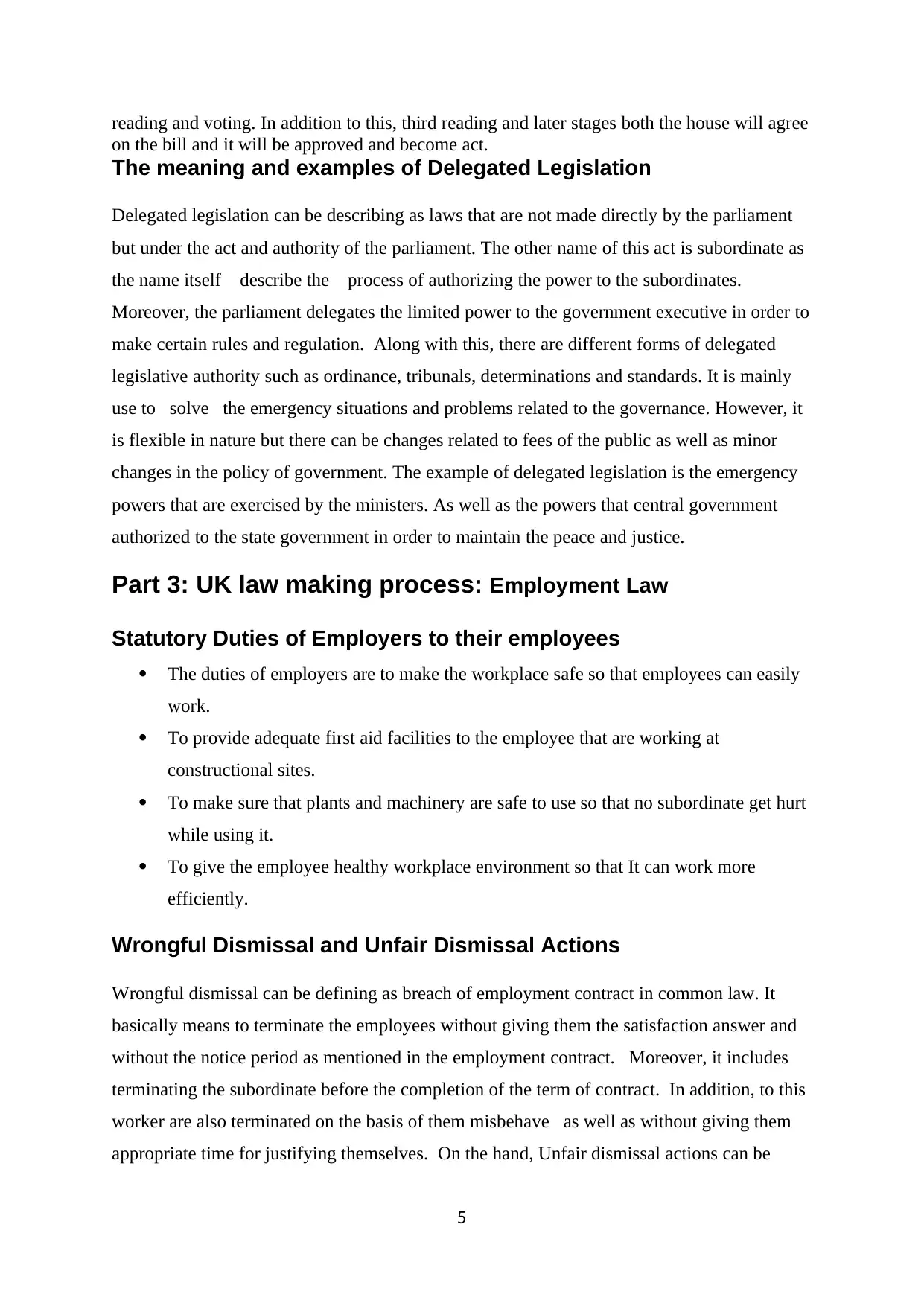
reading and voting. In addition to this, third reading and later stages both the house will agree
on the bill and it will be approved and become act.
The meaning and examples of Delegated Legislation
Delegated legislation can be describing as laws that are not made directly by the parliament
but under the act and authority of the parliament. The other name of this act is subordinate as
the name itself describe the process of authorizing the power to the subordinates.
Moreover, the parliament delegates the limited power to the government executive in order to
make certain rules and regulation. Along with this, there are different forms of delegated
legislative authority such as ordinance, tribunals, determinations and standards. It is mainly
use to solve the emergency situations and problems related to the governance. However, it
is flexible in nature but there can be changes related to fees of the public as well as minor
changes in the policy of government. The example of delegated legislation is the emergency
powers that are exercised by the ministers. As well as the powers that central government
authorized to the state government in order to maintain the peace and justice.
Part 3: UK law making process: Employment Law
Statutory Duties of Employers to their employees
The duties of employers are to make the workplace safe so that employees can easily
work.
To provide adequate first aid facilities to the employee that are working at
constructional sites.
To make sure that plants and machinery are safe to use so that no subordinate get hurt
while using it.
To give the employee healthy workplace environment so that It can work more
efficiently.
Wrongful Dismissal and Unfair Dismissal Actions
Wrongful dismissal can be defining as breach of employment contract in common law. It
basically means to terminate the employees without giving them the satisfaction answer and
without the notice period as mentioned in the employment contract. Moreover, it includes
terminating the subordinate before the completion of the term of contract. In addition, to this
worker are also terminated on the basis of them misbehave as well as without giving them
appropriate time for justifying themselves. On the hand, Unfair dismissal actions can be
5
on the bill and it will be approved and become act.
The meaning and examples of Delegated Legislation
Delegated legislation can be describing as laws that are not made directly by the parliament
but under the act and authority of the parliament. The other name of this act is subordinate as
the name itself describe the process of authorizing the power to the subordinates.
Moreover, the parliament delegates the limited power to the government executive in order to
make certain rules and regulation. Along with this, there are different forms of delegated
legislative authority such as ordinance, tribunals, determinations and standards. It is mainly
use to solve the emergency situations and problems related to the governance. However, it
is flexible in nature but there can be changes related to fees of the public as well as minor
changes in the policy of government. The example of delegated legislation is the emergency
powers that are exercised by the ministers. As well as the powers that central government
authorized to the state government in order to maintain the peace and justice.
Part 3: UK law making process: Employment Law
Statutory Duties of Employers to their employees
The duties of employers are to make the workplace safe so that employees can easily
work.
To provide adequate first aid facilities to the employee that are working at
constructional sites.
To make sure that plants and machinery are safe to use so that no subordinate get hurt
while using it.
To give the employee healthy workplace environment so that It can work more
efficiently.
Wrongful Dismissal and Unfair Dismissal Actions
Wrongful dismissal can be defining as breach of employment contract in common law. It
basically means to terminate the employees without giving them the satisfaction answer and
without the notice period as mentioned in the employment contract. Moreover, it includes
terminating the subordinate before the completion of the term of contract. In addition, to this
worker are also terminated on the basis of them misbehave as well as without giving them
appropriate time for justifying themselves. On the hand, Unfair dismissal actions can be
5
⊘ This is a preview!⊘
Do you want full access?
Subscribe today to unlock all pages.

Trusted by 1+ million students worldwide
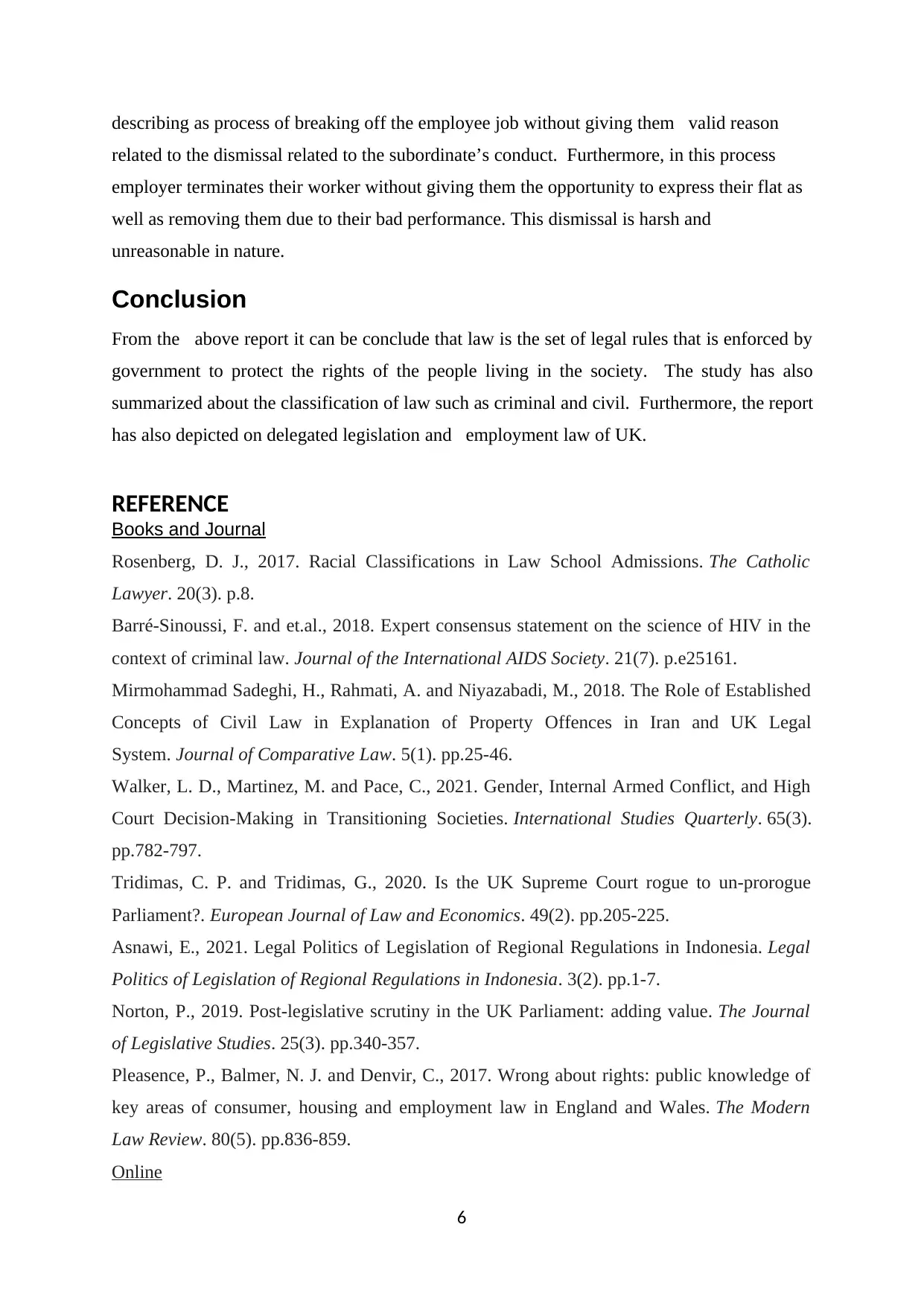
describing as process of breaking off the employee job without giving them valid reason
related to the dismissal related to the subordinate’s conduct. Furthermore, in this process
employer terminates their worker without giving them the opportunity to express their flat as
well as removing them due to their bad performance. This dismissal is harsh and
unreasonable in nature.
Conclusion
From the above report it can be conclude that law is the set of legal rules that is enforced by
government to protect the rights of the people living in the society. The study has also
summarized about the classification of law such as criminal and civil. Furthermore, the report
has also depicted on delegated legislation and employment law of UK.
REFERENCE
Books and Journal
Rosenberg, D. J., 2017. Racial Classifications in Law School Admissions. The Catholic
Lawyer. 20(3). p.8.
Barré‐Sinoussi, F. and et.al., 2018. Expert consensus statement on the science of HIV in the
context of criminal law. Journal of the International AIDS Society. 21(7). p.e25161.
Mirmohammad Sadeghi, H., Rahmati, A. and Niyazabadi, M., 2018. The Role of Established
Concepts of Civil Law in Explanation of Property Offences in Iran and UK Legal
System. Journal of Comparative Law. 5(1). pp.25-46.
Walker, L. D., Martinez, M. and Pace, C., 2021. Gender, Internal Armed Conflict, and High
Court Decision-Making in Transitioning Societies. International Studies Quarterly. 65(3).
pp.782-797.
Tridimas, C. P. and Tridimas, G., 2020. Is the UK Supreme Court rogue to un-prorogue
Parliament?. European Journal of Law and Economics. 49(2). pp.205-225.
Asnawi, E., 2021. Legal Politics of Legislation of Regional Regulations in Indonesia. Legal
Politics of Legislation of Regional Regulations in Indonesia. 3(2). pp.1-7.
Norton, P., 2019. Post-legislative scrutiny in the UK Parliament: adding value. The Journal
of Legislative Studies. 25(3). pp.340-357.
Pleasence, P., Balmer, N. J. and Denvir, C., 2017. Wrong about rights: public knowledge of
key areas of consumer, housing and employment law in England and Wales. The Modern
Law Review. 80(5). pp.836-859.
Online
6
related to the dismissal related to the subordinate’s conduct. Furthermore, in this process
employer terminates their worker without giving them the opportunity to express their flat as
well as removing them due to their bad performance. This dismissal is harsh and
unreasonable in nature.
Conclusion
From the above report it can be conclude that law is the set of legal rules that is enforced by
government to protect the rights of the people living in the society. The study has also
summarized about the classification of law such as criminal and civil. Furthermore, the report
has also depicted on delegated legislation and employment law of UK.
REFERENCE
Books and Journal
Rosenberg, D. J., 2017. Racial Classifications in Law School Admissions. The Catholic
Lawyer. 20(3). p.8.
Barré‐Sinoussi, F. and et.al., 2018. Expert consensus statement on the science of HIV in the
context of criminal law. Journal of the International AIDS Society. 21(7). p.e25161.
Mirmohammad Sadeghi, H., Rahmati, A. and Niyazabadi, M., 2018. The Role of Established
Concepts of Civil Law in Explanation of Property Offences in Iran and UK Legal
System. Journal of Comparative Law. 5(1). pp.25-46.
Walker, L. D., Martinez, M. and Pace, C., 2021. Gender, Internal Armed Conflict, and High
Court Decision-Making in Transitioning Societies. International Studies Quarterly. 65(3).
pp.782-797.
Tridimas, C. P. and Tridimas, G., 2020. Is the UK Supreme Court rogue to un-prorogue
Parliament?. European Journal of Law and Economics. 49(2). pp.205-225.
Asnawi, E., 2021. Legal Politics of Legislation of Regional Regulations in Indonesia. Legal
Politics of Legislation of Regional Regulations in Indonesia. 3(2). pp.1-7.
Norton, P., 2019. Post-legislative scrutiny in the UK Parliament: adding value. The Journal
of Legislative Studies. 25(3). pp.340-357.
Pleasence, P., Balmer, N. J. and Denvir, C., 2017. Wrong about rights: public knowledge of
key areas of consumer, housing and employment law in England and Wales. The Modern
Law Review. 80(5). pp.836-859.
Online
6
Paraphrase This Document
Need a fresh take? Get an instant paraphrase of this document with our AI Paraphraser

Analysis of legislation as Sources of law., 2021. [Online]. Available through <
https://www.legalserviceindia.com/legal/article-4922-analysis-of-legislation-as-a-source-of-
law.html>.
>.
7
https://www.legalserviceindia.com/legal/article-4922-analysis-of-legislation-as-a-source-of-
law.html>.
>.
7
1 out of 8
Related Documents
Your All-in-One AI-Powered Toolkit for Academic Success.
+13062052269
info@desklib.com
Available 24*7 on WhatsApp / Email
![[object Object]](/_next/static/media/star-bottom.7253800d.svg)
Unlock your academic potential
© 2024 | Zucol Services PVT LTD | All rights reserved.

